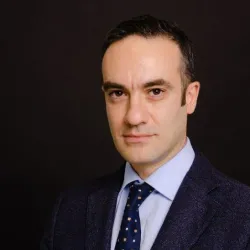Navigating legal challenges in central banking: governance, climate, and innovation
Legal risks Q4 2024
Navigating legal challenges in central banking: governance, climate, and innovation
Date: November 25-27
Time: 8:00am-11am (EDT) | 1pm-4pm (GMT) | 2pm-5pm (CET) | 9pm-12am (SGT)
Location: Virtual
At the conclusion of the training, participants will be able to:
- Learn how Central Banks navigate dynamic legal landscapes, mastering responses to evolving technologies, regulations, and cyber threats.
- Understand the multifaceted legal risks faced by Central Banks, from digital currencies to policy uncertainties and climate change imperatives.
- Explore how Central Banks strategically address complex legal challenges, honing skills to navigate diverse issues like political pressures and potential lawsuits.
- Develop expertise in cross-border collaboration, gaining insights into legal considerations and challenges when navigating international laws and agreements.
Chair

Niall Lenihan
Senior adviser/ Assistant general counsel
European Central Bank
Speakers

Diarmuid Murphy
Central Bank of Ireland
Diarmuid has spent a considerable part of his career working on and writing about financial resilience and the operational aspects of central banking, and he has worked across the globe with many central banks and national supervisory and resolution authorities.
Diarmuid began his central banking career at the Central Bank of Ireland (CBI) and was part of the team that played a key role in the CBI’s response to the Irish financial crisis. Diarmuid has also worked in the market operations area of the European Central bank and spent several years at the International Monetary Fund (IMF), in both the central banking and crisis management areas, where he participated in the IMF’s technical assistance and Financial Sector Assessment Program (FSAP) work. Having returned to the CBI in 2018, Diarmuid took over responsibility for Brexit and fintech related banking/payment institution/e-money authorisations and banking contingency planning, establishing a new unit. In 2020, Diarmuid undertook a fellowship program with the Financial Stability Institute at the Bank for International Settlements in Basel focusing on crisis management issues.
In late 2021 Diarmuid commenced a secondment to the EU Commission, where he is now part of the Commission’s team responsible for implementing its published Renewed Sustainable Finance Strategy where his focus continues to be on financial resilience issues.
Diarmuid also co-leads the development and delivery of a dedicated comparative central banking module as part of a new online Global Central Banking and Financial Regulation master’s degree course with Warwick Business School (and in partnership with the Bank of England).

Eamonn White
Independent consultant
Ardhill Advisory and former Bank of England and Hong Kong Monetary Authority
Eamonn is Director of Ardhill Advisory LTD, an independent consulting firm focused on advising financial institutions, central banks, national authorities and international organisations, including the International Monetary Fund, on financial stability policy. This includes advising on prudential regulation, bank resolution, central bank liquidity and crisis management.
Between 2020 and 2022, Eamonn was a senior advisor to the Bank of England (BoE), leading a resolution planning team for a large UK bank as part of the BoE's Resolvability Assessment Framework, contributing to UK resolution policy development and cross-border cooperation with international authorities on resolution issues.
From 2016 and 2019, Eamonn was Head of the Resolution Office at the Hong Kong Monetary Authority (HKMA). During this time, he was responsible for leading the development of the domestic statutory/regulatory resolution regime for all Hong Kong banks, leading resolution planning for banks in Hong Kong, often in close cooperation with foreign authorities, and contributing to the international cross-border resolution policy framework and resolution plans for global banks through his work as a member of the Financial Stability Board committees and for the cooperative organization of East Asia-Pacific Central Banks (EMEAP).
Before joining the HKMA, Eamonn worked on financial stability topics, including bank resolution at the Bank of England for 4 years. He was also a senior policy advisor to the Chancellor of the Exchequer at HM Treasury (HMT) for 7 years. At HMT he worked at the centre of the UK’s policy and strategic response to the financial crisis, both managing bank failure and the policy response to the Too-Big-To-Fail problem.
In his early career, Eamonn was a diplomat in Washington DC, covering EU foreign policy and trade issues.

Adrian Dumitrescu Pasecinic
Senior Consulting Counsel
IMF
Adrian is a Senior Consulting Counsel in the FF Division. A national of Romania, Mr. Dumitrescu Pasecinic worked at the European Commission as Legal Counsel focusing on Monetary and Central Bank Law and Digital Currency. Prior to this Mr. Dumitrescu Pasecinic worked as a Legal Officer in the Legal Department of the European Banking Authority. Additionally, Mr. Dumitrescu Pasecinic held such positions as a Counsellor to the Legal Department, as Head of the European and International Law Unit, Senior Legal Counsel and Legal Counsel at the National Bank of Romania. Mr. Dumitrescu Pasecinic received his Masters degree from the University of Bucharest, Faculty of Law, Romania, and his PhD from the West University of Timisoara, Romania. Mr. Dumitrescu Pasecinic can be contacted via email at adumitrescupaseci@imf.org.

Joseph Plumb
Legal counsel
Bank of England
Joseph works in the Central Banking Legal Division of the Bank of England. His work focuses on the bank's market operations, including the bank's standing facilities under the Sterling Monetary Framework.

Daniel Zwi
Legal counsel
Bank of England
Daniel works in the Central Banking Legal Division of the Bank of England. His work focuses on the bank's market operations, including the bank's standing facilities under the Sterling Monetary Framework.

Dr Phoebus Athanassiou
Senior lead legal counsel, financial law division
European Central Bank
Dr. Phoebus Athanassiou is Senior Lead Legal Counsel with the Financial Law Division of the European Central Bank, and a member of the Faculty of the Institute of Law & Finance at Frankfurt University. He holds a PhD in Law, from King’s College, London, and he is a qualified lawyer. He has published extensively on financial services, capital markets regulation, and EMU-related issues. He is the author of several monographs, including Digital Innovation in Financial Services – Legal Challenges and Regulatory Policy Issues (Kluwer, 2018), and academic contributions in refereed journals and collective works.

Sonja Davidovic
Advisor
BIS Innovation Hub
Agenda
13:00 – 13:15
Course introduction led by the chair
14:00 - 14:15
- Introductions and welcome from the chairperson
- Overview of the training course
- Discussion of the delegate expectations
13:15 – 14:00
The interaction of new mandates, autonomy, and governance
14:15 - 15:00
- Overview of changing central bank function and risk profile
- Legal foundations of effective corporate governance
- Comparative analysis of developments in selected jurisdictions
- Discussion: how are legal departments responding to the impact of current disruptive forces?
14:00 – 14:15
Coffee Break
03:00 - 03:15
14:15 – 15:00
Resolution authorities in court
15:45 - 16:30
- The calculus of credibility: mandate, reputation, independence and accountability
- Impact on policy, processes and reputation
- Case study: lessons learnt from court experience and preparations
Mr Marques is currently a Senior Financial Sector Expert at the IMF. He was previously Head of Division at the Resolution Department of the Bank of Portugal, responsible for legal, policy and regulatory affairs related with banking resolution and deposit insurance. Before that, between 2004 and 2013, he worked as a legal counsel in the Baking Supervision Department of the Bank of Portugal, mainly advising on regulation and policy issues related with capital requirements, internal governance, licensing and crisis management. He is a Law Graduate from Universidade Nova de Lisboa.
Mr Marques has been an active participant in the European discussions on banking resolution and crisis management since 2009. He represented Portugal as an expert in the negotiations of the Bank Recovery and Resolution Directive and the Single Resolution Mechanism Regulation in the Council of the European Union. He also participated actively in the European Banking Authority’s work on recovery and resolution issues, and chaired several working groups. During the Portuguese Presidency of the European Union he co-chaired the Council Ad-Hoc Working Party on the Establishment of a European Deposit Insurance Scheme.
Finally, Mr Marques has extensive practical experience in the resolution of systemic banks in Portugal. In 2014 he was a senior manager in the resolution process of one of the largest banks in Portugal (Banco Espírito Santo, SA) and in 2015 he chaired the task force at the Bank of Portugal responsible for the resolution of BANIF – Banco Internacional do Funchal, SA.
15:00 – 15:15
Coffee break
16:00 - 16:15
15:15 – 16:00
The design and strategies underpinning cross-border bank resolution
16:15 - 17:00
- Key design elements of effective cross-border resolution frameworks
- Overview of strategies used for cross-border crisis management
- Tips for effective cross jurisdiction co-operation and coordination
- Discussion: how to plan for the resolution of internationally active banks?
Eamonn White
Independent consultant
Ardhill Advisory and former Bank of England and Hong Kong Monetary Authority
Eamonn is Director of Ardhill Advisory LTD, an independent consulting firm focused on advising financial institutions, central banks, national authorities and international organisations, including the International Monetary Fund, on financial stability policy. This includes advising on prudential regulation, bank resolution, central bank liquidity and crisis management.
Between 2020 and 2022, Eamonn was a senior advisor to the Bank of England (BoE), leading a resolution planning team for a large UK bank as part of the BoE's Resolvability Assessment Framework, contributing to UK resolution policy development and cross-border cooperation with international authorities on resolution issues.
From 2016 and 2019, Eamonn was Head of the Resolution Office at the Hong Kong Monetary Authority (HKMA). During this time, he was responsible for leading the development of the domestic statutory/regulatory resolution regime for all Hong Kong banks, leading resolution planning for banks in Hong Kong, often in close cooperation with foreign authorities, and contributing to the international cross-border resolution policy framework and resolution plans for global banks through his work as a member of the Financial Stability Board committees and for the cooperative organization of East Asia-Pacific Central Banks (EMEAP).
Before joining the HKMA, Eamonn worked on financial stability topics, including bank resolution at the Bank of England for 4 years. He was also a senior policy advisor to the Chancellor of the Exchequer at HM Treasury (HMT) for 7 years. At HMT he worked at the centre of the UK’s policy and strategic response to the financial crisis, both managing bank failure and the policy response to the Too-Big-To-Fail problem.
In his early career, Eamonn was a diplomat in Washington DC, covering EU foreign policy and trade issues.
13:00 – 13:45
Towards a legal framework for digital currency and crypto assets
14:00 - 14:45
- Taxonomy of digital money: CBDCs, crypto assets and e-money
- What are the key legal aspects for e-money framework based on existing good practices?
- How to establish legal certainty of crypto assets and address legal risks?
- How to achieve a solid legal foundation for any CBDC issuance?
Adrian is a Senior Consulting Counsel in the FF Division. A national of Romania, Mr. Dumitrescu Pasecinic worked at the European Commission as Legal Counsel focusing on Monetary and Central Bank Law and Digital Currency. Prior to this Mr. Dumitrescu Pasecinic worked as a Legal Officer in the Legal Department of the European Banking Authority. Additionally, Mr. Dumitrescu Pasecinic held such positions as a Counsellor to the Legal Department, as Head of the European and International Law Unit, Senior Legal Counsel and Legal Counsel at the National Bank of Romania. Mr. Dumitrescu Pasecinic received his Masters degree from the University of Bucharest, Faculty of Law, Romania, and his PhD from the West University of Timisoara, Romania. Mr. Dumitrescu Pasecinic can be contacted via email at adumitrescupaseci@imf.org.
13:45 – 14:30
Use cases of modern technologies in the field of payments, securities settlement, and central banking: benefits and legal challenges
14:45 - 15:30
- Impact of disruptive innovation on financial services industry
- Tips for creating a legal framework that best manages the development of fintech
- Strategies for balancing innovation with financial stability and consumer protection
- Discussion: what are the legal issues presented by fintech in participants’ home jurisdictions?
Dr. Phoebus Athanassiou is Senior Lead Legal Counsel with the Financial Law Division of the European Central Bank, and a member of the Faculty of the Institute of Law & Finance at Frankfurt University. He holds a PhD in Law, from King’s College, London, and he is a qualified lawyer. He has published extensively on financial services, capital markets regulation, and EMU-related issues. He is the author of several monographs, including Digital Innovation in Financial Services – Legal Challenges and Regulatory Policy Issues (Kluwer, 2018), and academic contributions in refereed journals and collective works.
14:30 – 14:45
Coffee break
15:30 - 15:45
14:45 – 15:30
Immunity from execution of central banks assets
14:00 - 14:45
- International legislative and judicial trends in strengthening central bank immunities
- The policy and operational factors behind these trends
- Discussion: expectations for further developments in this are considering current affairs
15:30 – 16:00
Crisis management, resolution and liquidity facility arrangement
16:30 - 17:00
- Building blocks for emergency liquidity and funding in resolution
- Practical challenges around central bank liquidity support in resolution
- The experience of the Irish banking crisis
- Country developments around the world
Diarmuid has spent a considerable part of his career working on and writing about financial resilience and the operational aspects of central banking, and he has worked across the globe with many central banks and national supervisory and resolution authorities.
Diarmuid began his central banking career at the Central Bank of Ireland (CBI) and was part of the team that played a key role in the CBI’s response to the Irish financial crisis. Diarmuid has also worked in the market operations area of the European Central bank and spent several years at the International Monetary Fund (IMF), in both the central banking and crisis management areas, where he participated in the IMF’s technical assistance and Financial Sector Assessment Program (FSAP) work. Having returned to the CBI in 2018, Diarmuid took over responsibility for Brexit and fintech related banking/payment institution/e-money authorisations and banking contingency planning, establishing a new unit. In 2020, Diarmuid undertook a fellowship program with the Financial Stability Institute at the Bank for International Settlements in Basel focusing on crisis management issues.
In late 2021 Diarmuid commenced a secondment to the EU Commission, where he is now part of the Commission’s team responsible for implementing its published Renewed Sustainable Finance Strategy where his focus continues to be on financial resilience issues.
Diarmuid also co-leads the development and delivery of a dedicated comparative central banking module as part of a new online Global Central Banking and Financial Regulation master’s degree course with Warwick Business School (and in partnership with the Bank of England).
Eamonn White
Independent consultant
Ardhill Advisory and former Bank of England and Hong Kong Monetary Authority
Eamonn is Director of Ardhill Advisory LTD, an independent consulting firm focused on advising financial institutions, central banks, national authorities and international organisations, including the International Monetary Fund, on financial stability policy. This includes advising on prudential regulation, bank resolution, central bank liquidity and crisis management.
Between 2020 and 2022, Eamonn was a senior advisor to the Bank of England (BoE), leading a resolution planning team for a large UK bank as part of the BoE's Resolvability Assessment Framework, contributing to UK resolution policy development and cross-border cooperation with international authorities on resolution issues.
From 2016 and 2019, Eamonn was Head of the Resolution Office at the Hong Kong Monetary Authority (HKMA). During this time, he was responsible for leading the development of the domestic statutory/regulatory resolution regime for all Hong Kong banks, leading resolution planning for banks in Hong Kong, often in close cooperation with foreign authorities, and contributing to the international cross-border resolution policy framework and resolution plans for global banks through his work as a member of the Financial Stability Board committees and for the cooperative organization of East Asia-Pacific Central Banks (EMEAP).
Before joining the HKMA, Eamonn worked on financial stability topics, including bank resolution at the Bank of England for 4 years. He was also a senior policy advisor to the Chancellor of the Exchequer at HM Treasury (HMT) for 7 years. At HMT he worked at the centre of the UK’s policy and strategic response to the financial crisis, both managing bank failure and the policy response to the Too-Big-To-Fail problem.
In his early career, Eamonn was a diplomat in Washington DC, covering EU foreign policy and trade issues.
13:00 – 13:45
Project Mandala: unlocking the potential of programmable compliance
15:45 - 16:30
- A case study of the BIS Project Mandala
- Evolutionary journey of financial, regulatory, and supervisory technology
- How has RegTech and SupTech impacted the financial services industry?
- Examples of applications in regulatory reporting and compliance risk management
13:45 – 14:30
Managing legal risks of taking non-traditional collateral
14:45 - 15:30
- Overview of the legal risks associated with collateral taking
- Strategies for the due diligence process of collateral taking
- Dealing with the legal risks in taking raw loans
- Discussion: different collateral risks in home jurisdictions
Joseph works in the Central Banking Legal Division of the Bank of England. His work focuses on the bank's market operations, including the bank's standing facilities under the Sterling Monetary Framework.
Daniel works in the Central Banking Legal Division of the Bank of England. His work focuses on the bank's market operations, including the bank's standing facilities under the Sterling Monetary Framework.
14:30 – 14:45
Coffee break
15:30 - 15:45
14:45 – 15:30
Effectively mitigating legal risk to central banks from evolving climate mandates
15:15 - 16:00
- Impact of climate change on central banks’ mandates and responsibilities
- Understanding the legal implications of climate change policies
- Examples of national and cross-jurisdictional initiatives
- Discussion: do central banks have sufficient legal powers to effectively contribute to the greening of the financial system? How do they do it?
Diarmuid has spent a considerable part of his career working on and writing about financial resilience and the operational aspects of central banking, and he has worked across the globe with many central banks and national supervisory and resolution authorities.
Diarmuid began his central banking career at the Central Bank of Ireland (CBI) and was part of the team that played a key role in the CBI’s response to the Irish financial crisis. Diarmuid has also worked in the market operations area of the European Central bank and spent several years at the International Monetary Fund (IMF), in both the central banking and crisis management areas, where he participated in the IMF’s technical assistance and Financial Sector Assessment Program (FSAP) work. Having returned to the CBI in 2018, Diarmuid took over responsibility for Brexit and fintech related banking/payment institution/e-money authorisations and banking contingency planning, establishing a new unit. In 2020, Diarmuid undertook a fellowship program with the Financial Stability Institute at the Bank for International Settlements in Basel focusing on crisis management issues.
In late 2021 Diarmuid commenced a secondment to the EU Commission, where he is now part of the Commission’s team responsible for implementing its published Renewed Sustainable Finance Strategy where his focus continues to be on financial resilience issues.
Diarmuid also co-leads the development and delivery of a dedicated comparative central banking module as part of a new online Global Central Banking and Financial Regulation master’s degree course with Warwick Business School (and in partnership with the Bank of England).
15:30 – 16:00
Closing remarks and delegate action plans
16:30 - 17:00
- Summary of the course
- Discussion of the observed trends and case studies
- Application of learning points in the delegates’ home organisations
- Preparation of action points
